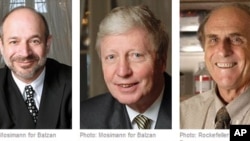A Canadian-born scientist was awarded the Nobel Prize in medicine on Monday for his discoveries about the immune system, but hours later his university said that he had been dead for three days, according to The Associated Press.
The Nobel committee had been unaware of Ralph Steinman’s death and it was unclear whether the prize would be rescinded because Nobel statutes don’t allow posthumous awards.
Steinman, 68, who shared the prize with American Bruce Beutler and French scientist Jules Hoffmann, died on Sept. 30 of pancreatic cancer, according to Rockefeller University, which said he had been treated with immunotherapy based on his discovery of dendritic cells two decades earlier.
The cells help regulate adaptive immunity, an immune system response that purges invading microorganisms from the body.
The Nobel statutes don’t allow posthumous awards unless a laureate dies after the announcement but before the Dec. 10 award ceremony. That happened in 1996 when economics winner William Vickrey died a few days after the announcement.
Nobel officials said they believed it was the first time that a laureate had died before the announcement without the committee’s knowledge.
The 2011 Nobel Prize for Medicine was awarded Steinman and to two scientists for their work increasing understanding of the immune system.
The award, announced Monday in Stockholm, Sweden, went to Bruce Beutler of the United States, Jules Hoffmann of Luxembourg and the late Ralph Steinman of Canada. Beutler and Hoffmann will split half the nearly $1.5 million prize money.
They have been credited with work that could lead to new prospects for curing cancer and other diseases.
The Royal Swedish Academy of Sciences will name the winner in physics Tuesday and chemistry Wednesday. An award for economics, given in memory of Alfred Nobel, will be announced October 10.
The 2011 Nobel Peace Prize recipient will be named Friday.
The Nobel Prizes were created by Alfred Nobel, a wealthy Swedish industrialist who invented dynamite. The first Nobel Prizes were awarded in 1901.
Ninety-one Nobel Peace Prizes have been awarded. On 19 different occasions, the prize committee felt there were no nominees who met the criteria for the award..
The International Committee of the Red Cross has been recognized most often, with three awards.
Only one Peace laureate has declined the award. In 1973 Vietnamese politician Le Duc Tho, was recognized along with U.S. Secretary of State Henry Kissinger. Le Duc Tho declined the Nobel Peace Prize.
Some information for this report was provided by AP and AFP.




